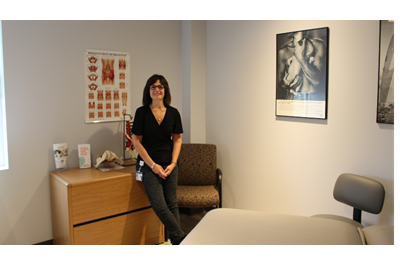05/02/2021
Perhaps if every postpartum woman received physical therapy, they wouldn’t have pelvic issues that plague them later on in life, Sarah Clarke recently pondered. After having two children, now in their teens, and leading a fairly active lifestyle – running, dancing, yoga – Clarke found herself last year with a severe pelvic prolapse that required multiple reconstructive procedures, including a partial hysterectomy and urethral sling.
“I’d never had to live with discomfort before. It was traumatic,” said
Clarke, 48. “This was my first brush with growing old. It felt disconcerting.
Everything had shifted.”
After her reconstructive surgery in November, Clarke went to the Obstetric and Pelvic Health Physical Therapy program at Putnam Hospital’s Outpatient Rehabilitation Department.
Carolyn Winuk, a Doctor of Physical Therapy, heads the program and specializes in the treatment of female pelvic floor
dysfunction, including diagnoses such as urinary and fecal incontinence,
chronic constipation, organ prolapse, pelvic pain and pregnancy-related
musculoskeletal conditions. She has practiced for more than 30 years.
“Carolyn is really good at this. She’s calm, she’s professional and you can talk to her about really intimate things without feeling weird,” Clarke said. “Through the work we did, she brought me back to my body. She gave me back my pelvis.”
Clarke met once or twice weekly with Winuk for six weeks and, in
addition to pelvic floor strengthening exercises and deep tissue massage, they
utilized biofeedback in their therapy sessions. Biofeedback is a
computerized, patient-guided treatment that facilitates awareness of how the
pelvic floor musculature is functioning via an audiovisual display. The patient is then better able to manipulate
responses and develop techniques to better control and coordinate these
muscles.
Winuk is board certified in Biofeedback for Pelvic Muscle Dysfunction (BCB-PMD) by the Biofeedback Certification International Alliance (BCIA). She is among fewer than 150 health professionals nationwide with this distinction.
“Pelvic health physical therapy utilizes manual
therapy techniques, exercise instruction, behavioral modification and
modalities such as biofeedback to reduce pain, increase strength and offer a
comprehensive approach to symptom control,” Winuk said. “There is a wealth of evidence-based clinical
research to support the use of physical therapy as a highly effective,
conservative treatment option for so many of these prevalent pelvic floor
disorders.”
Patients are typically referred to the Obstetric and Pelvic Health Physical Therapy program from their primary care physicians, urologists, gastroenterologists, gynecologists, obstetricians, urogynecologists or midwives. Initial visits are one hour and include a thorough review of medical history followed by a comprehensive neuromuscular and postural evaluation. Subsequent visits are typically one to two times weekly for up to one hour and can vary from four to 12 weeks in duration, depending on diagnosis. All sessions are held in a private, dedicated treatment room in the hospital’s Outpatient Rehabilitation Department.
“Carolyn helped me strategize so that I could optimize and work with the pelvis that I’ve been given,” Clarke said. “I’m emotionally 100 percent better and getting there physically.”
To schedule an appointment, please call (845) 279-1785 (TTY 800-421-1220).
